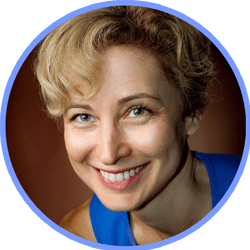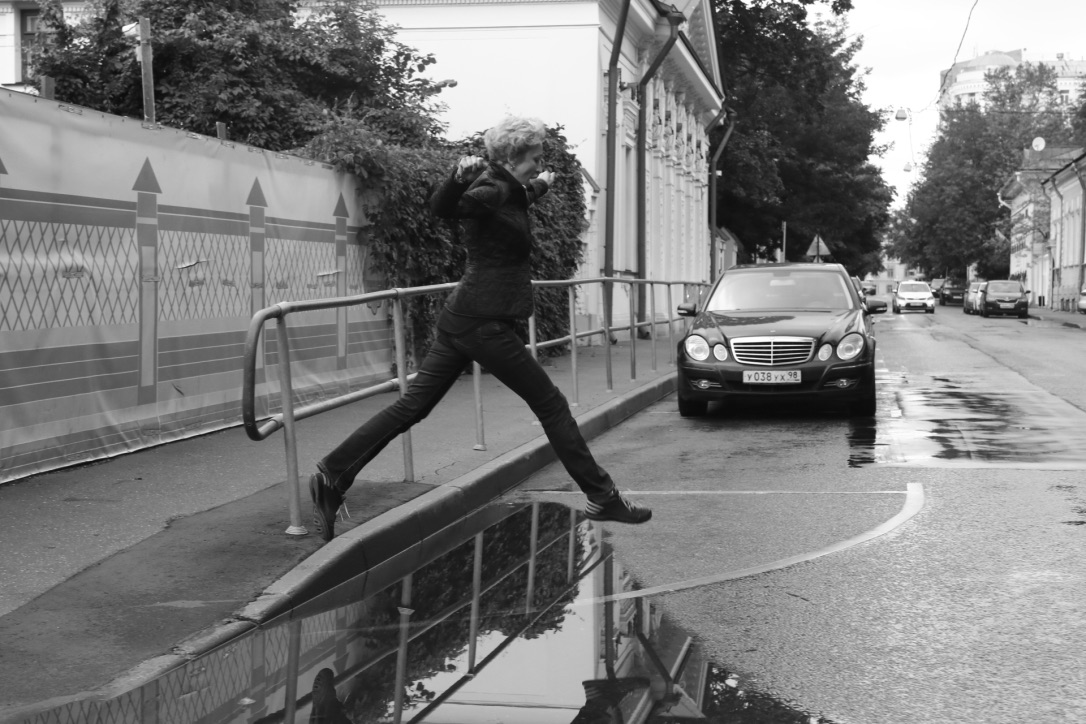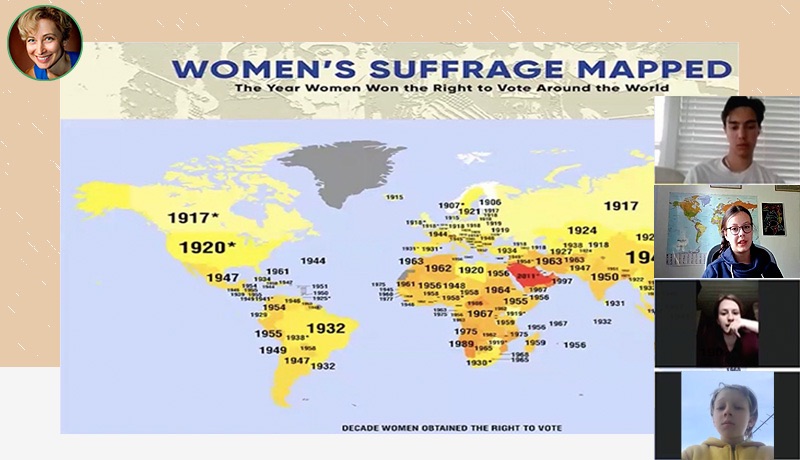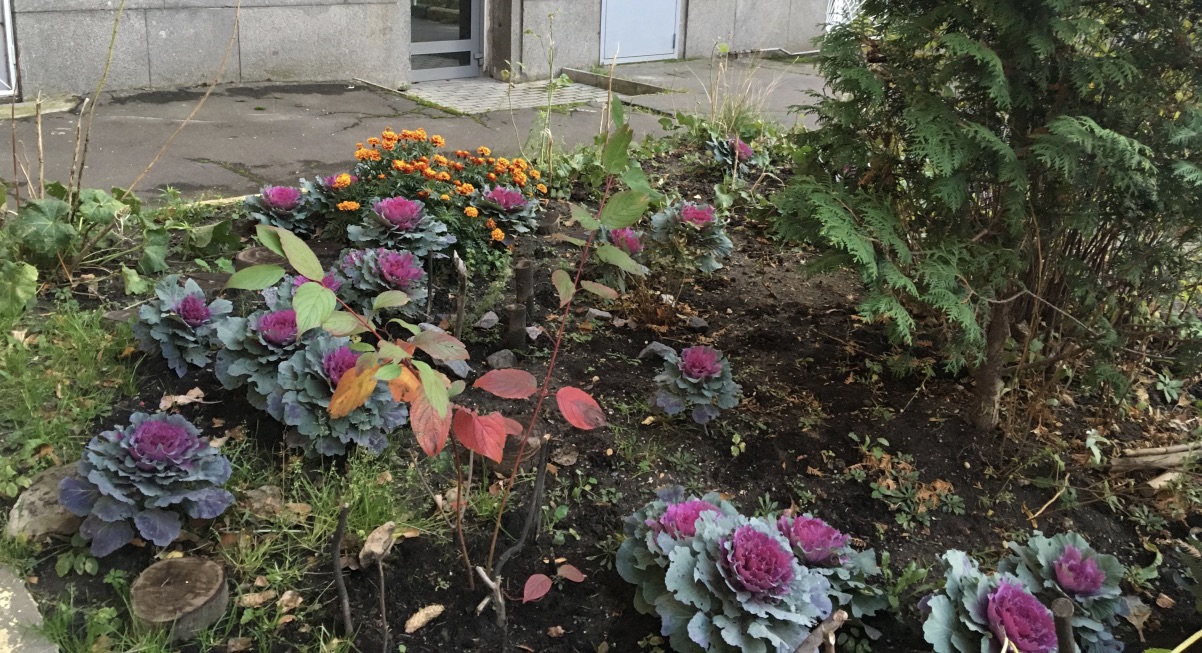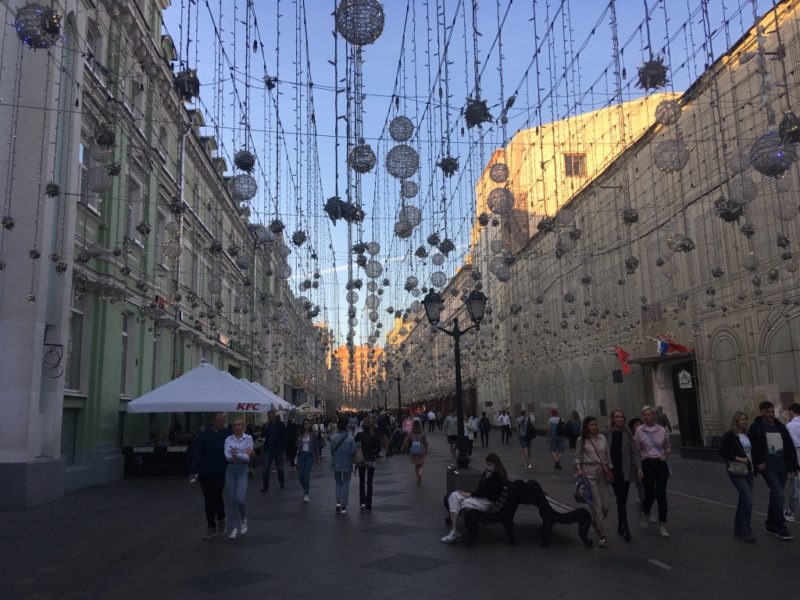Illness
In December 2020 I had covid-19. In November my parents had it. Fortunately, they got over it alright. “May the sun always shine”, as we sang such as children, may family always be.
Searching For Meaning And Daily Bread
In April, a company called MFS, which employed me since March 2019, let me know that they did not have more assignments for me.
In summer, I gave an online course «Femininity. Masculinity. Equality » to teenagers, my friends’ children. I thought it would be good to put together thoughts and experiences from the Women in Business programme in Morocco, my recent project. However, the subject – “What Gender Equality Really Is?” – turned out to be both complex and fascinating. I decided to continue reading and writing on the topic and to put together a course for adults in 2021, so that there is more knowledge in the world, and peaceful debate.
My loving and beloved friend used to be quite judgemental about women and women’s needs. I would argue with him: “What you are saying is not true about me”. «Well”, he’d laugh, “you are a margin of error”. Exploring gender seems to be my way of responding to some controversial statements he put forward.
I started to give private classes of English. “English language and Western European Literature” was the profession I chose at seventeen, started practising at 21 and quit at 24 switching to management consulting. The good thing is, I never got tired of or disappointed by teaching.
Getting ready for my classes these days, I read on various subjects. At a lesson, I feel a bit like a psychotherapist as I work on connecting emotionally, and a bit like an actress, which seems to work as self-therapy. The next step will be getting my students together to discuss various subjects online – monarchs, finance, tech, books, films. I hope we will all have good fun educating and entertaining ourselves.
Flowers
Moscow saw a warm and long summer in 2020. My flat is in a nice big building constructed in the 1950s. All sorts of different people live in there: academics, functionaries, businessmen. Some neighbours are very nice, others are not so nice. “Why is she planting flowers near our entrance?” – “You see, Nina has her windows overlooking this area”.
I suggested that we neighbours should all contribute to buying little trees and bushes in the nearby Botanic Garden and plant them to cover bald spots on the lawns. No one got enthusiastic, so this will be my own gardening project for this year.
This Is Unbelievable
In 2020 the Russian state organised a massive promotional campaign to persuade citizens to vote for several constitutional amendments, including an amendment that removes any maximum limit on presidential terms. The acting president seems to want to prolong his time in the Kremlin indefinitely, hence the need to change the law.
The authorities acted with cynicism, one example being offering a printed version of the amended constitution in bookstores even before the voting. The only city where people protested in 2020 was Khabarovsk, with demands similar to our protests in Moscow in 2019 – against prosecution of people for political reasons.
In August, it was impossible not to follow, day and night, the events in Belarus. I was proud of the protesting people and shocked by the horrible violence of police.
The leader of the Russian opposition was poisoned in August shortly before he boarded a flight from Tomsk to Moscow. Thanks to the pilot who took decision to land the aircraft and to an ambulance brigade who gave him an antidote, Alexey Navalny survived.
The poisoning, the plot, a medieval sort of thing, makes me feel bad about living in the country where this is possible. I used to say that I live in Moscow just because I did not manage to arrange to live elsewhere. I do not watch TV and do not engage with establishments representing the state, the authorities, etc. Nevertheless, the reality is impossible to ignore.
The words “amendments to the Constitution” in the voting bulletin were printed with a grammatical mistake in Russian. These millions of copies have unintentionally documented the sloppy and careless manner of those currently in power.
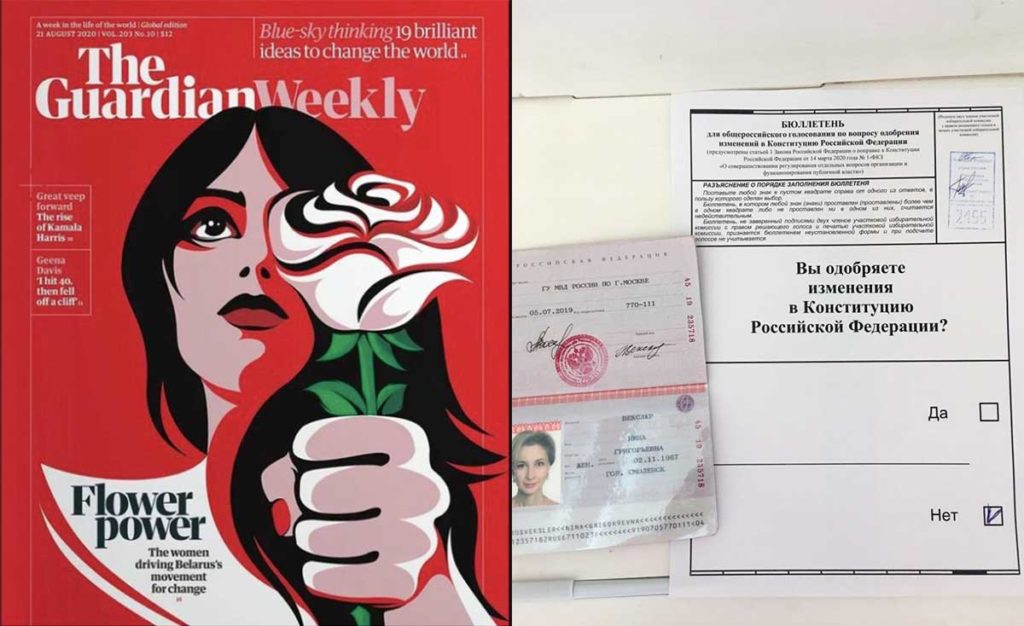
Moscow
Moscow is a city where things change rapidly, pushing away memories of the past. There used to be trolleybuses everywhere, but by the end of the year they had all been replaced by electric buses. The critics and opponents of the change pointed out that the night parking lots for the trolleybuses in central Moscow will be now taken over by developers.
The new construction in Moscow is often described as predatory. How many more huge buildings does this city need? Some construction plans endanger a fragile balance existing in long-inhabited areas of the city with green parks, ponds and playgrounds. Those who want to stop renovators have to devote life to petitions and street protests. In my area, Gagarinsky, we once stopped a project of turning a road into a highway, but other attempts were not so successful. Moscow authorities seem to have been exchanging favours with construction companies for years.
The city center is heavily decorated. From spring through autumn young trees dry up to be replaced my new ones. Cheerful flowerbeds appear out of nowhere at a stunning speed: flowers, which probably get grown in greenhouses are transported in boxes, and workers in orange vests arrange them into sophisticated compositions.
“Flowers are ephemeral, we do not record them”, the geographer said to the Little Prince. “I don’t amuse myself with balderdash. I am concerned with matters of consequence” – heard the Prince from a serious businessman. With ephemeral flowers, one can make money out of thin air: record them as you wish, flowers remain silent.
Bulldozers crash away pavements, which look perfect but will be replaced nevertheless. Drillers and hammers are relentless and very loud. The sounds, I am afraid, drum a dangerous idea into heads, that anything can be destroyed and then built anew.
Some Celebrate, Others Get Hungover
Mining companies operate in Siberia and in the North of Russia but are registered in Moscow. The companies pay hundreds of billions of roubles to the state federal budget, a resource extraction tax. Neither local nor regional entities get this money. In October 2020 an oil pipeline in Usinsk at the Kharyaga oil field in Nenets Autonomous District ruptured and oil spilled into the Kolva River. A state of emergency was declared because of water and air conditions. Local divisions of Lukoil were ordered to clean up the damage, but the affected party – local residents – have no leverage over either the production companies or the state.
I have heard from friends in Siberia about poisonous factory emissions and avalanches caused by underground mining-related explosions. Local people believe that abnormally strong winds that tear off roofs, knock down cars, and throw passers-by onto the roadway are all nature’s revenge.
When a state of emergency was declared in the town of Usinsk, Yulia Galyamina, a municipal deputy in Moscow, shared her comments on the efforts of the local activists. She wrote about a grass-roots initiative, a committee for nature protection, which has been working since the 1990s: “Only such people keep this country going. Thanks to them we still have some nature to save”.
Galyamina was sentenced by Moscow’s Tverskoy Court to two years probation in December 2020. She had been campaigning against the constitutional amendments. State prosecutors were seeking a three-year prison sentence for “violating the rules for conducting rallies and pickets”, for actions that “created a threat to the health of citizens, disrupted pedestrians and transport”. This decision of the court makes it clear that participation in meetings and free expression of opinion can be interpreted as a threat to state security and public stability. The targets are definitely social and political activists.
My parents
«Such people keep this country going” – this I often hear said about my father, chief designer of a radio component plant in Smolensk. While in hospital with covid-19, not feeling well at all, he daily answered dozens of calls from work. I know that at different times of his life he has been nervous about work but those were people issues, not technical issues.
When I get emotional saying that one should walk away if one does not feel appreciated and has to deal with ill-mannered people on top of that – he’d say: “I will feel like a traitor if I leave now”. When I get angry and demand that he thinks of becoming a part-time consultant rather than devote 60 hours a week to work because other people do not do their job properly, he’d say: “I don’t know how to lead from behind a corner”.
And this is after his confession at one of his covid 19 moments, that for more than fifty years he has seen that turnstile of his plant gate every morning and every evening and this must be enough for now: family time has come.
My parents, professionals well respected by colleagues, hardworking, respectful and sensitive people, have never wanted to leave Russia or Smolensk. I have not heard them complaining that they could have a better pay or a more comfortable life. My dad used to knock icicles off the roof and shovel snow off the paths when I was little and we lived in a two-storey house of eight flats. Then they moved to a block of flats and he regularly dealt with a clogged rubbish chute, and repaired broken benches in the yard or broken locks on an entrance door. My mum continues to clean the floor and the walls in the building entrance. She is still surprised, after all those years, that neighbours do not seem to care about the state of the entrance way. She plants flowers on plots of land near the building entrance, dresses nicely and looks at herself in the mirror before going shopping. Every day she invents new cooking recipes and every month changes curtains and table cloths she had knitted. She talks to the potted plants, too. She is often getting worried about her children and grandchildren, especially about “the boys” – her son and her grandson.
My parents, like Atlas, are supporting the heavens of the Universe above me. Their commitment to each other and to family has no limits. They are honest and intelligent people who have always stayed away from both big lies or trivial gossip. However, for the last seven years, when we meet on birthdays and seasonal holidays, we talk more about the past we shared than about the present we face, as if we live in different worlds.
I cannot help being bitter about my parents’ voting for the constitutional amendments. I try to understand why they, like many others, seem wilfully accepting of things that happen here and that should not be accepted.
“Foreign Agents”
With my colleague, gender expert and lecturer at a business school in France, we talked about her course on environmental protection. I mentioned the mining facility in a Siberian town, which has been polluting the local environment. Russian oligarchs owning the facility are known in Moscow and Saint-Petersburg for their support of theatre and music festivals. The philanthropic activities far away in the capitals do not impress local people who have difficulty breathing when the wind is blowing from the plant.
“Why don’t those local people protest?” – the colleague asked. “They depend on this mining facility, almost every family has a connection with it, people do not want to lose jobs,” I answered. “But if they protest as part of a public organisation, then there is no risk for an individual, or is there?”
In Russia, there is no counterbalance to the institutions of power. The only civic organisation I am involved in is the housing association, which we neighbours registered in order to have influence on a company, which is supposed to maintain our block of flats. As for environmental and educational initiatives supported by international organisations, they belong to history. I
n 2012, some sophisticated changes appeared in the Russian law on non-profit organisations. NGO’s involved in political activities and receiving some foreign funding were given a status of “foreign agents”. This meant more attention from state regulators, more audits and more obligatory reports. In addition, such organisations became obliged to mark their publications, posters, banners etc. with a visible label saying “foreign agent”.
All this would be funny if it were not so sad. Since the legislative changes came into force, many small non-profits and individual volunteers with international roots left the country. According to the law, «political activity» is understood broadly. Anyone trying to influence public opinion in any way is seen as involved into politics. Two years ago, international media working in Russia got the status of “foreign agents”. In December 2020, five individuals – three journalists, one human rights defender and one art activist were declared foreign agents as well. The artist, Daria Apakhonchich, was asked to resign from the Red Cross where she had worked for years teaching Russian to migrants. Her employers state that the Red Cross is impartial, and she is in politics, so she must leave.
I used pictures showing Daria’s street art in my online course on gender equality. Her 2019 series of posters highlight the problem of home violence, which is in fact de-criminalised in today’s Russia. The draft law on home violence has been discussed since the 2010s, criticised heavily, and de-prioritised recently. The functionaries and the ruling politicians find the topic dangerous as it clearly touches on human rights issues.
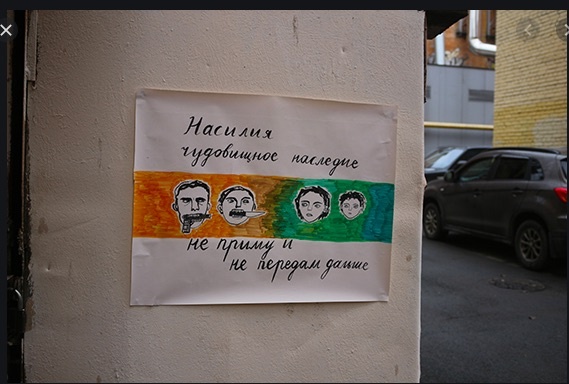
Poster by Daria Apakhonchich: “I will not accept the awful legacy of violence, I will not pass on”
Propaganda
In Russian, the mere words “foreign agent” conjure up an image of an unpleasant or even hostile alien. As a child, I read short stories of Soviet writers where agents of The Tsarist Gendarmerie were vicious characters representing the power of Imperial Russia, “the prison of the peoples”.
The agents would denounce underground fighters – to the police, the “gendarmerie”. One of the short stories, “Tania, the Revolutionary”, was about a brave girl Tania who helped her parents. When “agents” and police came to search the home of Tania’s family, she, without anybody noticing, cleverly used a big jug full of milk to hide metallic letters used to produce anti-tsar posters. That smart step saved her father from prison.
Another example comes from a song. Once a week during our primary and middle school years we had music lessons. Our teacher played accordion, we were given pieces of paper with words of the songs, to sing and learn by heart. My favourite one was “The Brown Button”, about a foreign spy who came by foot to a Soviet border outpost, to examine fortifications.
For us it was something quite real – we lived in Smolensk, a town very close to Belarus and the Western borders of the USSR. The 1939 annexation of the Eastern European territories by the Soviet Union was still a living memory in some families. We sang and imagined the time when some Soviet borders had been blurred and easy to cross.
The foreign agent from the song – a vicious spy – did not notice that a button from his knickerbockers pocket had fallen off. The brown button with non-Russian letters on it was lying on a dusty country road. A schoolboy named Alyosha noticed it, picked it up and reported his find to border guards.
The guards searched through nearby villages for four days and finally found the western spy – a young man with fortification map in the pocket with a missing button.

All three of these characters are now fond memories – Tania, Alyoshka and even the brave button-less spy. The propaganda of my childhood time seems harmless and cute. The world was certainly a better place then. All my family, all my loved ones were still here.
I find it quite strange that some people in the former Soviet Union cherish the memory of not just one’s young years but of a paradise lost. As if everything was good in that great country, and some rare difficulties had been caused by external, foreign enemies.
I also find it strange that some believe in overseas directors who orchestrated the Minsk protests last summer, the Ukrainian Orange Revolution in 2005 and Maidan in 2014 as well as the Jasmine revolution and the Arab Spring. Who were those destroying the USSR, its industry, its army, education system, people’s morality, who made Russia an enemy to former sister countries? – Those were -of course!- imperialists and their spies.
Saint-Petersburg deputy Boris Vishnevskiy shared a sad joke on Facebook on November 4, 2020: «… today, in the US, they elect a person who for the next four years will cut pensions in Russia, who will raise prices, continually dig holes in the roads, switch off gas, close down hospitals, litter in children’s playgrounds. Just the person to be elected does not know that yet».
Or maybe I am mistaken and no one ever thinks anything like that. As the sun disperses a cloud of smog over Moscow, its street and parks become crowded, and people seem very happy, as if all they had been longing for was the sun.
The most important
In February 2020, my daughter introduced me to her friends’ wonderful project “From the Author”. In a small theatre hall in the centre of Moscow, modern Russian poets read their poetry and share thoughts about the creative process and about their life experiences. The recitals are recorded by five cameras to be made in a thirty minute film afterwards. The director, Roma Liberov urges the audience to remain very quiet so that no background noises interfere with the poet’s voice. As of early 2021, more than fifty films have been produced.
Apart from this programme, Roma Liberov is the author of seven film works about Russian writers. In August 2020 he was looking for a typist for the final scene of his latest film in memory of Andrey Platonov. I suggested that I could do it, and Roma found for me an old typewriter, a dress from the 1970s and horn-rimmed glasses. The work on the film, which has lasted several years, was completed in September. On the November 5, “The Innermost Man” was released.
In the end, the picture shows a typewriter typing the names of those who worked on the film. The sound of the typewriter keys recalls the time samizdat, an underground press in the Soviet Union. The word “samizdat” translates as “we publish ourselves”, (“we”= “the people”, not “the state”). Thanks to those who typed and shared prohibited texts, which the official editorial houses would not publish, we used to read Platonov and others.
Is that aging lady on the screen – me? Yes, that’s me. Yeah, well, that’s the way it is.
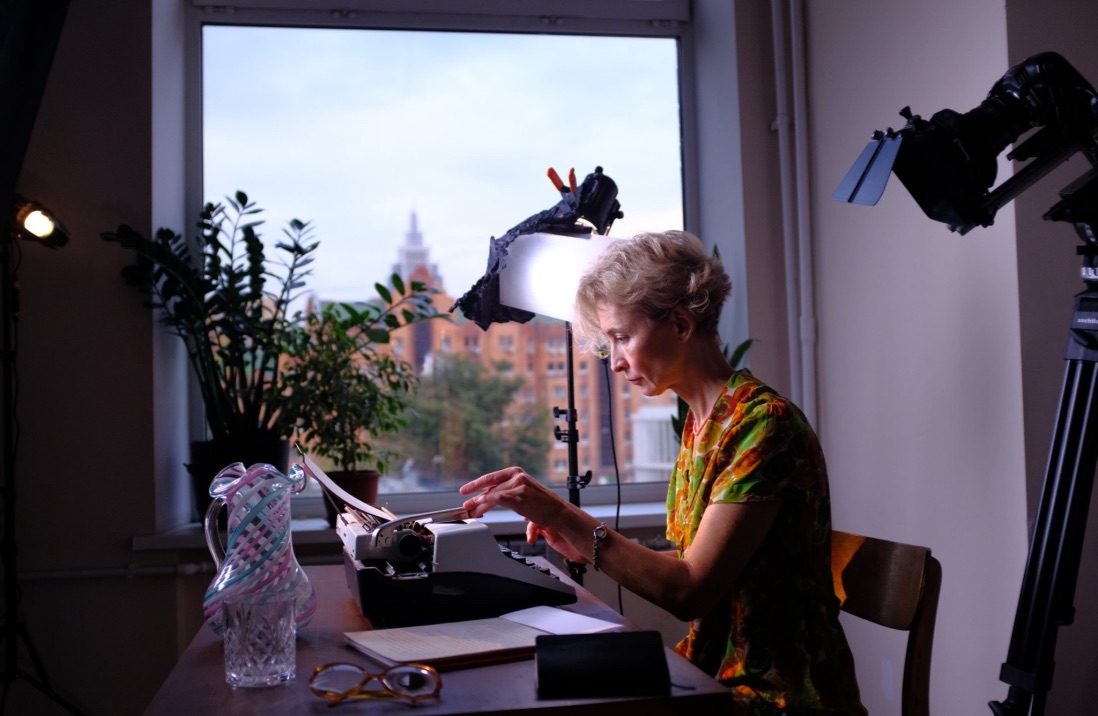
Reading what Roma says in his interviews, on poets, literature, politics and life in Russia I cannot help thinking… well, he has done so much already. He brings together so many people, and together they create something new and completely unusual.
I have not managed to do anything significant yet. What was there? Lomonosov University, languages, rented flats, working for banks, leaving the corporate world to do what I really like. “She is brave to a fault”, friends say, my two wonderful children, the struggle to manage on my own… Looking for excuses. Nothing to point at, really, but I’m still here, to fill my life with meaningful things. There’s happiness here, and love, too.
Have mercy upon him, o Lord, have mercy upon us
My friend died a bitter and unexpected death on January 19, 2020. How he could have left me, I don’t understand. He used to say that I didn’t just make him happy, but that I made him feel alive. I am in love, we are in love. While I walk in the street, I walk slower than before as I try to keep very upright, like he used to.
“What do you, so righteous and such an angel, find in someone like me?” – “Well, you are such a handsome man, tall, and thin, and strong. You have such a straight back, such a proud posture – you look like someone born in a free country” – “That’s excellent that you can see my wings! When I was a child, in order not to slouch, I imagined that I had grown wings and they were spreading my shoulders and pulling me up”.
Those wings now I carry, and they hold me up, “for love is strong as death, passion fierce as the grave”.

Lechaim
Greeting the year 2021, may your loved ones are somewhere close so that you can hug them, hold them to your heart, hold the hands… may you have warm wind and sunshine, fresh white snow, quietness of a morning river, the freedom of the sea, coffee in your favourite cup, wine in a beautiful glass, crisp autumn apples, a campfire and songs from childhood. Other children are running around shouting and building huts just like we used to in those days. “Look at my roses”, says Mum, “and these are the ones grandma planted years and years ago”. It’s all happiness and let at least a tiny bit be in your life every day.
